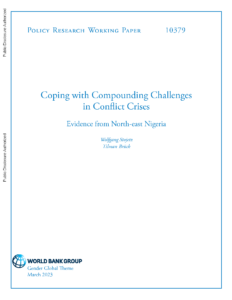This paper analyzes how the intersectionality of gender, forced displacement, and collective violence shapes coping behaviors in conflict crises, paying particular attention to household composition by gender and age. Drawing on survey data from 17,951 individuals in North-east Nigeria, the analysis finds that coping behaviors at the household, adult, and child levels are interlinked and strongly shaped by compounding challenges stemming from individual gender, household forced displacement status, and local violence shocks. These challenges have significant welfare implications and create severe vulnerabilities and special needs for specific groups of households and individuals, such as rural communities affected by violence, large households with many children, female breadwinners, and displaced girls. The findings emphasize the need for and potential of concerted policy approaches that account for the intersectionality of gender, displacement, and violence in conflict settings and pay particular attention to specific types of communities, households, and individuals.
Publication Details
- Year of Publication: 2023
- Region/s: Sub-Saharan Africa
- Theme/s: Human Development · Humanitarian Emergencies · Shocks & Livelihoods
- Research Topic/s: Disasters & Emergencies · Gender · Migration & Displacement · Poverty & Inequality · Violence & Conflict · Youth & Children
- DOI: https://documents.worldbank.org/en/publication/documents-reports/documentdetail/099424103272317155/idu08c7cd15e0cd8a042390a3420a9ae6643ca4e





